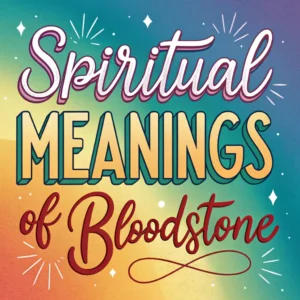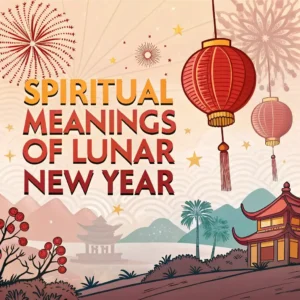Hyssop, a humble herb with deep spiritual roots, has captivated the hearts and minds of believers for centuries.
This aromatic plant, mentioned numerous times in sacred texts, holds a wealth of spiritual significance that continues to resonate with seekers of truth and enlightenment.
In this comprehensive exploration, we’ll delve into the 12 profound spiritual meanings of hyssop, uncovering its timeless wisdom and relevance in our modern world.
The Essence of Hyssop’s Spiritual Significance

Before we embark on our journey through the spiritual meanings of hyssop, let’s distill its essence into key points:
- Purification Symbol: Hyssop represents spiritual cleansing and renewal.
- Divine Connection: The herb serves as a bridge between the earthly and divine realms.
- Healing Power: Hyssop symbolizes physical and spiritual healing.
- Humility and Grace: It embodies the virtues of humility and God’s grace.
- Protection: The plant is associated with spiritual protection and warding off negative energies.
- Sacrifice and Atonement: Hyssop plays a role in rituals of sacrifice and atonement.
- Transformation: It represents spiritual transformation and growth.
- Wisdom: The herb is linked to divine wisdom and enlightenment.
- Forgiveness: Hyssop symbolizes divine forgiveness and mercy.
- Spiritual Awakening: It is associated with spiritual awakening and consciousness.
- Covenant: The plant represents the covenant between God and humanity.
- Rebirth: Hyssop signifies spiritual rebirth and new beginnings.
Now, let’s explore each of these spiritual meanings in depth, uncovering the rich tapestry of wisdom woven into this remarkable herb.
1. The Purifying Power of Hyssop
Hyssop’s most prominent spiritual meaning lies in its purifying properties. In ancient times, this herb was used in ritualistic cleansing ceremonies, symbolizing the washing away of sins and impurities.
The Psalmist David famously cried out, “Purge me with hyssop, and I shall be clean“, highlighting the herb’s association with spiritual cleansing.
Today, the concept of purification through hyssop reminds us of the importance of regular spiritual cleansing.
It encourages us to examine our hearts, release negative emotions, and seek inner purity. By embracing this aspect of hyssop’s symbolism, we can strive for a cleaner, more aligned spiritual state.
2. Hyssop as a Divine Connector
Hyssop serves as a powerful symbol of the connection between the earthly and divine realms. In ancient rituals, it was often used to sprinkle blood or water, acting as a conduit for divine blessings. This use of hyssop highlights its role as a mediator between humanity and the divine.
In our modern context, hyssop reminds us to seek connection with the divine in our daily lives.
It encourages us to cultivate practices that bridge the gap between the mundane and the sacred, helping us to experience a deeper sense of spiritual connection.

3. The Healing Essence of Hyssop
Beyond its purifying properties, hyssop carries significant meaning as a symbol of healing.
In ancient times, it was used for both physical and spiritual ailments, believed to have curative powers that extended beyond the physical realm.
This aspect of hyssop’s symbolism encourages us to view healing holistically, recognizing the interconnectedness of our physical, emotional, and spiritual well-being.
It reminds us that true healing often requires addressing all aspects of our being, not just the physical symptoms.
4. Hyssop: Embodiment of Humility and Grace
Hyssop, despite its humble appearance, plays a crucial role in many spiritual traditions.
This paradox embodies the virtues of humility and serves as a reminder of God’s grace working through even the smallest and seemingly insignificant things.
In our lives, the symbolism of hyssop encourages us to cultivate humility and to recognize the grace that flows through all aspects of creation.
It reminds us that true spiritual power often manifests through humble means, challenging us to look beyond outward appearances.

5. Hyssop as a Spiritual Shield
In many traditions, hyssop is associated with spiritual protection. Its use in purification rituals was believed to create a barrier against negative energies and spiritual threats.
This protective aspect of hyssop’s symbolism remains relevant today.
We can draw on this meaning by using the concept of hyssop as a reminder to maintain strong spiritual boundaries.
It encourages us to be mindful of the energies we allow into our lives and to actively protect our spiritual well-being.
6. Sacrifice and Atonement: Hyssop’s Sacred Role
Hyssop played a significant role in ancient sacrificial rituals, often used to sprinkle blood as part of atonement ceremonies.
This use highlights the herb’s association with concepts of sacrifice and making amends with the divine.
In our modern context, this aspect of hyssop’s symbolism reminds us of the importance of taking responsibility for our actions and seeking reconciliation when we’ve done wrong.
It encourages us to approach our spiritual journey with a sense of reverence and commitment.

7. Hyssop: A Symbol of Transformation
The use of hyssop in purification rituals also links it to the concept of spiritual transformation.
Just as the herb was used to cleanse and renew, it symbolizes our capacity for inner change and growth.
This transformative aspect of hyssop encourages us to embrace change in our spiritual lives.
It reminds us that growth often requires letting go of the old to make way for the new, inspiring us to continually evolve on our spiritual path.
8. Divine Wisdom Embodied in Hyssop
In some traditions, hyssop is associated with divine wisdom and enlightenment. Its use in sacred rituals was believed to impart spiritual knowledge and insight.
Today, we can interpret this aspect of hyssop’s symbolism as a call to seek deeper understanding in our spiritual lives.
It encourages us to remain open to divine guidance and to cultivate wisdom through study, meditation, and spiritual practice.

9. Hyssop: A Testament to Divine Forgiveness
The use of hyssop in purification rituals also links it strongly to the concept of divine forgiveness. Its cleansing properties symbolize the washing away of sins and the restoration of spiritual purity.
This meaning of hyssop serves as a powerful reminder of the availability of forgiveness in our spiritual journey.
It encourages us to seek forgiveness when we err and to extend forgiveness to others, recognizing this as a crucial aspect of spiritual growth.
10. Spiritual Awakening Through Hyssop
Hyssop’s association with purification and renewal also connects it to the concept of spiritual awakening.
Its use in rituals symbolizes a heightening of spiritual consciousness and an awakening to divine truths.
In our modern context, this aspect of hyssop’s symbolism encourages us to remain open to spiritual insights and experiences.
It reminds us to cultivate awareness in our daily lives, always ready for moments of spiritual awakening and growth.

11. Hyssop and the Divine Covenant
In some religious traditions, hyssop is linked to the concept of covenant or sacred agreement between God and humanity. Its use in rituals symbolizes the sealing of these divine pacts.
This meaning of hyssop reminds us of the importance of commitment in our spiritual lives.
It encourages us to honor our spiritual commitments and to recognize the sacred agreements that guide our path.
12. Rebirth and New Beginnings: Hyssop’s Promise
Finally, hyssop’s association with purification and renewal links it to the concept of spiritual rebirth. Its use in cleansing rituals symbolizes a fresh start and new spiritual beginning.
This aspect of hyssop’s symbolism offers hope and encouragement, reminding us that every moment offers an opportunity for a new beginning.
It inspires us to approach our spiritual journey with a sense of renewal and possibility, always open to fresh starts and new growth.
Frequently Asked Questions
What is the biblical significance of hyssop?
In the Bible, hyssop is primarily associated with purification and cleansing. It was used in various rituals, including the Passover and purification ceremonies. The most notable reference is in Psalm 51:7, where David asks God to “Purge me with hyssop, and I shall be clean“.
How can I use hyssop for spiritual purposes today?
While the literal use of hyssop in rituals is less common today, you can incorporate its symbolism into your spiritual practice. This might include using hyssop essential oil in meditation, visualizing hyssop during prayer for purification, or keeping hyssop plants as a reminder of spiritual cleansing and growth.
Is hyssop used in other spiritual traditions besides Christianity?
Yes, hyssop has significance in various spiritual traditions. In some pagan practices, it’s used for purification and protection. In Jewish tradition, it’s associated with the Passover. Some modern spiritual practices incorporate hyssop for its cleansing and protective properties.
Can hyssop be used for physical healing as well as spiritual purposes?
While hyssop is primarily known for its spiritual symbolism, it has been used in traditional medicine for various purposes. However, it’s important to consult with a healthcare professional before using hyssop or any herb for medicinal purposes.
What does it mean to be “whiter than snow” when cleansed with hyssop?
This phrase, from Psalm 51:7, is a metaphor for complete spiritual purification. It suggests that cleansing with hyssop (symbolically) can make one spiritually pure and free from sin, as white and clean as freshly fallen snow.

Hello, I’m Zephyra, your guide at SpiritualityEssence.com. I’m passionate about uncovering life’s mysteries and sharing transformative insights. Let’s explore mindfulness, ancient rituals, and the path to a more awakened life together. Join me on this spiritual journey!
















